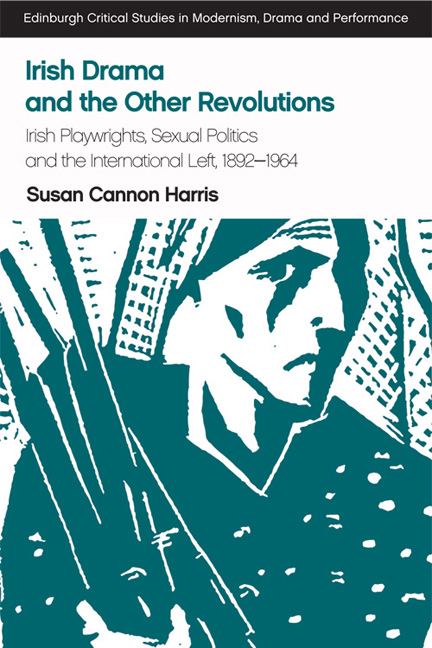 Irish Drama and the Other Revolutions
Irish Drama and the Other Revolutions Book contents
- Frontmatter
- Contents
- Acknowledgements
- Edinburgh Critical Studies in Modernism, Drama and Performance
- Introduction
- 1 Desiring Women: Irish Playwrights, New Women and Queer Socialism, 1892–1894
- 2 Arrested Development: Utopian Desires, Designs and Deferrals in Man and Superman and John Bull's Other Island
- 3 We'll Keep the Red Flag Flying Here: Syndicalism, Jim Larkin and Irish Masculinity at the Abbey Theatre, 1911–1919
- 4 Mobilising Maurya: J. M. Synge, Bertolt Brecht and the Revolutionary Mother
- 5 The Flaming Sunflower: The Soviet Union and Sean O'Casey's Post-Realism
- Epilogue: What The Irish Left – Sean O'Casey, Samuel Beckett and Lorraine Hansberry's The Sign in Sidney Brustein's Window
- Works Cited
- Index
Introduction
Published online by Cambridge University Press: 06 January 2018
- Frontmatter
- Contents
- Acknowledgements
- Edinburgh Critical Studies in Modernism, Drama and Performance
- Introduction
- 1 Desiring Women: Irish Playwrights, New Women and Queer Socialism, 1892–1894
- 2 Arrested Development: Utopian Desires, Designs and Deferrals in Man and Superman and John Bull's Other Island
- 3 We'll Keep the Red Flag Flying Here: Syndicalism, Jim Larkin and Irish Masculinity at the Abbey Theatre, 1911–1919
- 4 Mobilising Maurya: J. M. Synge, Bertolt Brecht and the Revolutionary Mother
- 5 The Flaming Sunflower: The Soviet Union and Sean O'Casey's Post-Realism
- Epilogue: What The Irish Left – Sean O'Casey, Samuel Beckett and Lorraine Hansberry's The Sign in Sidney Brustein's Window
- Works Cited
- Index
Summary
THE OTHER REVOLUTIONS
Irish Drama and the Other Revolutions re-examines the Irish dramatic revival in the context of two international revolutions that unfolded alongside the Irish struggle for national independence. These ‘other’ revolutions are: (1) a socialist movement which increased in scope, strength, and militancy from the 1880s into the 1950s, and (2) a campaign for gender and sexual liberation whose harbingers were the New Woman and the queer man, and whose emergence was closely linked to the late nineteenth-century European ‘free theatre’ movement and the twentieth-century avant-garde drama that arose from it. These revolutions came together in London at a time when the first generation of modern Irish writers – including W. B. Yeats, George Bernard Shaw and Oscar Wilde – were trying to establish literary careers there. Being, by virtue of their Irishness, excluded from what constituted normativity there, these self-displaced Irish playwrights were drawn into the web of influence and inspiration created by the interconnected struggles for sexual and social liberation. From the Ibsen revolution of turn-of-the-century London to the height of the Cold War on Broadway, Irish playwrights were enmeshed in both of these liberation struggles and impelled by their desires. Strategies that Irish playwrights developed for negotiating the interchange between socialist and sexual politics were then taken up, changed or contested by playwrights outside of Ireland. By examining the work of these Irish playwrights in the context of two other revolutions that defined the twentieth century, then, we will reach a richer understanding of the contributions of Irish playwrights to modern European drama, and of the interactions between embodiment and ideology that continue to define the possibilities and limitations of left politics in the twenty-first century.
By ‘left politics’ I mean the network of anticapitalist ideologies that proliferated rapidly around the globe during the nineteenth and twentieth centuries. These include Marxism, anarchism, syndicalism, anarcho-syndicalism, Communism (and its national variations in England, Spain, Germany, the USA, and the Soviet Union), and quite a few flavours of socialism. To attempt to maintain impermeable definitional boundaries around each one of these ideologies at all times would be as maddening and futile as trying to establish a bright-line rule for separating naturalism from realism.
- Type
- Chapter
- Information
- Irish Drama and the Other RevolutionsPlaywrights, Sexual Politics and the International Left, 1892–1964, pp. 1 - 15Publisher: Edinburgh University PressPrint publication year: 2017


